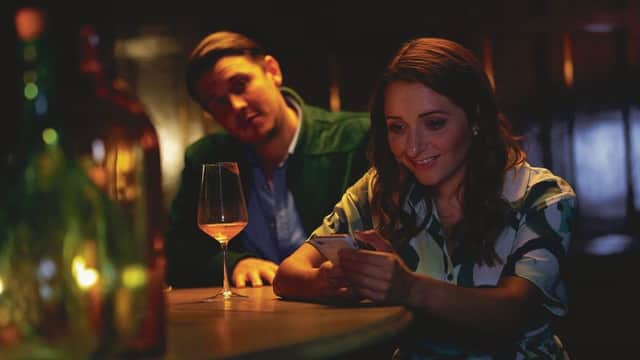Edinburgh International Festival preview: Scottish Opera's The Telephone


Gian Carlo Menotti’s 1946 comic opera,The Telephone is an absolute no-brainer when it comes to modern-day adaptation. Ben wants to propose to Lucy. She’s more interested, though, in her telephone and the non-stop calls that interrupt Ben’s attempts to pop the question. He gives up in despair and leaves the apartment, only to realise that the obvious way to grab Lucy’s attention is simply to call her. He does; she accepts.
Written as a partner piece to another of Menotti’s short operas, The Medium, and subtitled “L’Amour à trois,” The Telephone cries out for translation to a social satire on today’s irritating smartphone culture, which is exactly what director Daisy Evans has done in her filmed production for Scottish Opera, commissioned as part of this year’s socially distanced Edinburgh International Festival, and which goes live on the EIF YouTube channel from Saturday night.
Advertisement
Hide Ad“I try to make any work I do relatable, and this seemed an obvious opportunity to make an opera about those infernal things we’ve become so attached to,” says Evans, pointing immediately to the irony that she’s speaking to me via mobile from a noisy bus. Her reaction when invited to take on the project wasn’t one of instant enthusiasm. “I’d seen it staged at a London festival in quaint period setting, and immediately envisaged something very unwieldy and featuring something we don’t use so much anymore, home telephones.”
But the opportunity to direct the opera in film format tickled her creative fancy. With clever camera angles and close-ups she reckoned she could rethink any dated elements and bring both subject matter and emotional interactions up to date, while conquering the social distancing issue by fooling the eye into believing the characters were physically closer than they actually were. “Ultimately I wanted to find a way that opera can be done as television, and take advantage of what that offers,” Evans explains. “Things like intimacy, location and detail, being able to update the setting. It’s very different conceiving a stage play to conceiving a film, I have found. Through film you can really guide the eye and make things clear.”
Nor is she doing Menotti – the eccentric Italian-American composer who in later life relocated to Scotland – any disservice. He was, after all, one of the pioneers of television opera, writing his most famous work, Amahl and the Night Visitors, for NBC New York, its studio premiere broadcast live in 1951 to an estimated five million viewers across the entire USA. He would surely have approved. So we now find Ben and Lucy (Jonathan McGovern and Soraya Mafi) in an Edinburgh pub: the bar in the King’s Theatre, to be exact. And Evans has added actor Hannah Birkin as the bartender: “It would have been silly not to have someone behind the bar.”
Helping Evans here is the eclectic plurality of Menotti’s score, a filmic underlay as flirtatious and flighty as Lucy’s incessant phone calls – which range from banal gossip to irritating wrong numbers – juxtaposing gushy Romanticism one minute with acerbic modernism the next. His music (pre-recorded by members of Scottish Opera Orchestra under musical director Stuart Stratford) has been dismissed by some as “poor man’s Puccini,” but it’s hard not to appreciate its easygoing energy, theatrical pungency and lyrical charm. “It even turns into an MGM musical in the final duet, where you can imagine a Julie Andrews figure prancing off down the road,” Evans suggests, adding of Lucy: “She’s a typical modern girl going out with a guy, and guilty of looking at her phone far too much, constantly checking on Google and posting on Twitter and Instagram.”
Evans, an Edinburgh University music graduate whose work with her London-based Silent Opera Company regularly draws rave reviews, is a dab hand at exploring new ways to present opera. “I’ve always said it’s not opera that is inaccessible, it’s the form that it presents itself in. So it’s a really good time to be doing more immersive stuff, more outside stuff, and certainly more opera on film.”
This is Scottish Opera’s second filmed opera project in as many months. I’d like to talk more to Evans about where it all goes from here, but sadly I have to hang up. There’s another call coming in.
Advertisement
Hide AdScottish Opera’s film version of Menotti’s The Telephone goes live on the Edinburgh International Festival YouTube channel from Saturday 8 August, www.youtube.com/user/edinburghintfestival. For full programme, visit www.eif.co.uk
A message from the Editor
Thank you for reading this story on our website. While I have your attention, I also have an important request to make of you.
Advertisement
Hide AdWith the coronavirus lockdown having a major impact on many of our advertisers - and consequently the revenue we receive - we are more reliant than ever on you taking out a digital subscription.
Subscribe to scotsman.com and enjoy unlimited access to Scottish news and information online and on our app. With a digital subscription, you can read more than 5 articles, see fewer ads, enjoy faster load times, and get access to exclusive newsletters and content. Visit https://www.scotsman.com/subscriptions now to sign up.
Joy Yates
Editorial Director